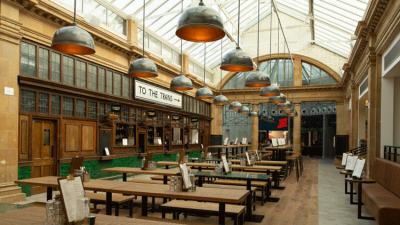Simon Anderson: "We look for young, independent chef-driven businesses"

How did the idea for Market Halls arise?
It’s a reinvention of the food halls concept that we developed from our visits around the world. We have amazing street food markets here but we don’t really have the communal food hall dining concepts you find in Asia or America. We don’t see ourselves as a competitor to street food but as an add-on to that.
How does it differ from the street food venues that came before it?
We are not a street food business, we look at existing restaurants and people who want to create a second concept, not just street food traders, so it’s a wide pool to draw from. Street food markets tend to be open-air so we have the innovation of a roof. They tend to operate over a few days whereas we are a seven-day-a-week operation, and we trade from breakfast through to dinner. We take on long property leases and invest in them, unlike some street food venues that have a more temporary feel.
You have two sites, in Fulham and Victoria. Why open there?
We are a very data-driven business, we try to divorce ourselves from what is cool and use raw data to choose a site more efficiently. If we opened in the East End we would automatically have 100 other restaurants as competitors, so we chose Fulham where there is footfall and interest. With Victoria there has been massive investment and we’ve come in on the tail end of all of that, so we knew people were there. We need people all day and lots of them – Victoria is averaging 25,000 customers a week through the doors.
What data do you use?
Demographics, footfall, density of business and residential population. Where data gets really interesting is once we’re up and running. In Fulham we attract 15% of people that pass us, in Victoria only 8%. When we have a shit week we can look at the amount of people we had around us and see if other factors like the weather had an impact. It’s a useful tool to help us judge when the quiet periods are and when we should do some marketing to generate more trade.
How do you choose the traders for each venue?
We break the London restaurant scene into workable chunks and look at curating an offer that covers as many different bases as possible. We considered healthy and unhealthy eating, breakfast, lunch and dinner, and then we approached operators that I really admire, such as Koya and Roti King [for Victoria]. We look for young, independent chef-driven businesses.
Your next venue is Oxford Street
Yes. The scale is quite daunting, it’s 35,000sq ft of trading space. It will have 800-1,000 covers, 12 kitchens, and four bars. The first floor will be the size of four Victoria Market halls and upstairs will be a large bar with 300 covers and a retractable roof with an event space behind it. It will have 12 operators – originally it was 18 but we didn’t feel the balance between covers and traders was right. There’s a real opportunity as only 0.5% of the total square footage of Oxford Street is food and beverage.
And you’re then opening in Lakeside
Lakeside gets 25 million visitors a year, 65% of those people eat, and 70% are women. When you look at those figures, you can see there’s an opportunity there. It will have the same principles as what we are trying to do on the high street.
What’s next for Market Halls?
We are concentrating our attention for the next year and a half within the M25 as we know the London audience well. When we go further afield we’ll go to the north first as half our management team is based in Yorkshire and has a good understanding of that marketplace. Within the next few years we hope to have three or four more sites in London and three or four out of London. Our biggest challenge is to have managed successful growth.
This is a web version of an article that first appeared in the April issue of Restaurant magazine, the leading title for the UK's restaurant industry. For more features, comment, interviews and in-depth analysis of the restaurant sector subscribe to Restaurant magazine here.















